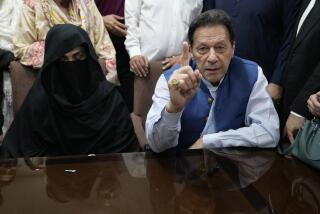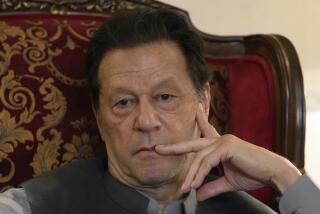Pakistan Broadcasts Scientist’s Confession
- Share via
ISLAMABAD, Pakistan — Abdul Qadeer Khan, the father of Pakistan’s atomic bomb, confessed in a televised address Wednesday to illegally passing nuclear weapons secrets to other countries and begged for forgiveness.
Khan asked President Pervez Musharraf to grant him clemency for what Pakistani authorities say was the black-market sale of nuclear bomb technology to Iran, Libya and North Korea that earned Khan millions of dollars.
But his statements left many questions unanswered and also left many Pakistanis and independent analysts speculating that he was being forced to take the fall for more powerful military leaders, who many believe were secretly behind the technology transfers.
The National Command Authority, a group of the country’s top military officers, government ministers and officials, chaired by Musharraf, said Wednesday night that Khan’s fate would be decided today at a special Cabinet meeting.
After being ordered confined to his house for days, Khan appeared on state-run television Wednesday, first being shown seeking forgiveness from Musharraf, who sat grim-faced in his camouflage and khaki general’s uniform, and then reading a confession to the nation.
Expressing “the deepest sense of sorrow, anguish and regret,” Khan, reading from an English text, said he wanted “to atone for some of the anguish and pain that has been suffered by the people of Pakistan on account of the extremely unfortunate events of the last two months.
“I take full responsibility for my actions and seek your pardon,” he said.
Khan said he and unnamed accomplices had acted without government authorization. He did not provide specifics about whom he gave the secrets to, how or why he dispersed the technology or what he received in return.
“I wish to place on record that those of my subordinates who have accepted their role in the affair were acting in good faith like me, on my instructions,” Khan said.
The face millions of Pakistanis saw on their TV screens Wednesday was not the proudly combative one they had come to idolize as successive governments glorified Khan’s effort to make Pakistan the world’s only nuclear-armed Muslim nation. This time, Khan appeared somber and contrite as he took the blame for passing the weapons secrets.
Politicians from across Pakistan’s political spectrum and analysts said it appeared that Khan, who has staunchly defended his nation’s right to have nuclear weapons, might have been falling on his sword to protect others.
“He was just one of the cogs in the machine,” Ayesha Siddiqa-Agha, a Pakistani defense and strategic analyst, said in an interview. “He was a very important player, but he was not the only player.”
Siddiqa-Agha said she believed the confession was part of a compromise that would allow Khan, and anyone in the armed forces who approved his actions, to suffer limited consequences.
In Washington, U.S. officials said they were eagerly awaiting information about the Pakistani government’s investigation into the dispersal of the secrets. They said they did not necessarily accept Khan’s contention that the breach had gone no further than him. “We’re not accepting or rejecting, we’re just digesting all of this,” one State Department official said.
Although Pakistani officials have said Khan acted for personal profit against government orders, U.S. officials have claimed that satellites spotted Pakistani military transport planes in North Korea in 2002. Pakistan’s government said Saturday that no nuclear proliferation occurred after February 2000, when Musharraf created the National Command Authority.
Following years of denying involvement in nuclear proliferation, Pakistan’s government admitted in December that individuals had acted wrongly -- after United Nations inspectors from the International Atomic Energy Agency uncovered evidence of Pakistani technology in Iran. Libya then said Pakistani scientists had aided its effort to build an atom bomb.
Pakistan’s ambassador to the United Nations, Munir Akram, said Wednesday that the government removed Khan from his post as head of the nation’s nuclear weapons production facility two years ago because of U.S. intelligence reports that the scientist was suspected of passing secrets to North Korea. The government thought that the ouster of Khan, who was then appointed as Musharraf’s personal advisor on science and technology, would halt the outflow, Akram said.
The recent revelations about Iran and Libya led to a further crackdown, he said.
“As information was shared with us as a result of the Iran and Libya investigations, we acted on it,” Akram said in New York. “We brought people in, asked questions and acted very aggressively. We basically eliminated the source of the problem.
“But obviously it was a whole international operation. Khan may have been essential, but the whole organization involved many other countries and many other companies.”
The possibility that suppliers retain blueprints and specifications and can still sell them to the highest bidder is alarming, said George Perkovich, a proliferation expert at the Carnegie Endowment for International Peace. “This is privatized proliferation, and that’s a very big deal,” he said. “You lower the entry cost and you lower the risk of getting into the game.”
Musharraf’s government has mishandled the affair so badly, and has apparently bent under foreign pressure, that Pakistanis aren’t sure what to believe anymore, said analyst Siddiqa-Agha.
“As a Pakistani, I don’t know what my government’s agenda is today because they keep changing the details so rapidly. It’s mind-boggling,” she said.
Lawmaker Farhatullah Babar, spokesman for exiled former Prime Minister Benazir Bhutto, pointed out that Khan made no mention of making money from the nuclear proliferation, but said only that he had acted “in good faith.”
“Scientists could not have done all this alone,” Babar said.
Exiled former Prime Minister Nawaz Sharif’s spokesman, Raja Zafar ul-Haq, said Musharraf was making Khan and other scientists scapegoats under pressure from the U.S., which he said is trying to roll back the Islamic nation’s nuclear program.
“The confession proves the greatness of Dr. A.Q. Khan, who had accepted the responsibility for nuclear proliferation under severe pressure of the military, just to make a sacrifice for the sake of saving Pakistan’s nuclear program,” Zafar said.
Khan, a metallurgist, gave Pakistan the breakthrough it needed to build nuclear arms in the 1970s after allegedly stealing blueprints from a plant in the Netherlands for an aluminum centrifuge used to enrich uranium to weapons grade.
In 1983, a Dutch court convicted Khan in absentia of taking the centrifuge plans while working at a uranium-enrichment facility operated by Urenco, a Dutch, German and British consortium. The conviction was overturned on appeal.
While leading Pakistan’s clandestine nuclear weapons program, Khan reportedly amassed millions of dollars in property and overseas bank accounts, and his wealth was hardly a secret in Pakistan.
Many Pakistanis thought he deserved to be rich for helping make their country a nuclear power. That was before the government accused him Sunday, in a briefing with Pakistani journalists, of enriching himself at the expense of national security.
Even then, Khan, who has been under a form of house arrest at his residence in Islamabad, has had powerful friends rally to his defense.
Qazi Hussain Ahmed, who leads a coalition of Islamist political parties in the National Assembly, said Tuesday that Khan had denied in a cellphone call that he had confessed to government investigators.
Ahmed also claimed that Khan said he transferred nuclear weapons technology to other countries with the full knowledge of top army officials, including Musharraf.
By Wednesday afternoon, Khan was telling a much different story.
A government statement broadcast Wednesday said Khan had asked to meet with Musharraf at the general’s home in Rawalpindi, 12 miles from Islamabad, the capital.
During the meeting, Khan “reconfirmed to the president the details of the proliferation activities that he had committed in the past, and had admitted earlier in interviews with the investigating team appointed by the government,” the official statement said.
Khan also “submitted before the president that he accepts full responsibility for all the proliferation activities which were conducted by him during the period in which he was at the helm of affairs of Khan Research Laboratories,” it said.
“Dr. Khan said he realized that these activities, which were in clear violation of different Pakistani laws, could have seriously jeopardized Pakistan’s nuclear capability and put the nation at risk,” the statement said.
In his TV address, Khan said he realized that Pakistan’s nuclear weapons program was vital to national security and pride.
“It is in this context that the recent international events and their fallout on Pakistan have traumatized the nation,” he said. “I have much to answer for it.”
Khan gave his assurance “that such activities will never take place in the future” and appealed to Pakistanis “to refrain from any further speculations and not to politicize this extremely sensitive issue of national security.”
But few Pakistanis believe they have heard the full story about the country’s role in spreading nuclear weapons technology.
Siddiqa-Agha said the government wouldn’t disclose the entire truth unless there was sufficient foreign pressure. And Washington, she added, probably feels it has already gone far enough in pushing Musharraf, an ally in the Bush administration’s declared war on terrorism who recently has survived multiple assassination attempts.
“I think they realize they can’t put a lot of pressure on Musharraf now,” she said.
Times staff writer Watson reported from New Delhi and special correspondent Zaidi from Islamabad. Times staff writers Paul Richter in Washington, Maggie Farley in New York and Douglas Frantz in Istanbul, Turkey, contributed to this report.
More to Read
Sign up for Essential California
The most important California stories and recommendations in your inbox every morning.
You may occasionally receive promotional content from the Los Angeles Times.













